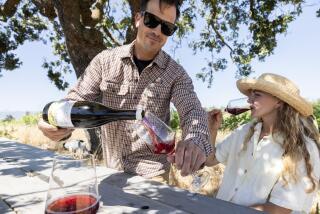INDEPENDENT FARMING : A Tough Row to Hoe : Vegetable growers face unfavorable weather, high overhead and dwindling profit margins.
Driving by long rows of freshly watered crops or stopping to get some produce, it’s easy to get caught up in romantic notions about farming and miss the struggle that many Ventura County farmers find themselves in. In truth, they are trying to make a living in a highly competitive, high-overhead business.
In the wake of the ongoing drought and this winter’s big freeze--which cost Ventura County farmers an estimated $128 million--many farmers say they feel they are fighting an uphill battle with the fickle forces of nature.
“There are enough tough facts in farming to scare the pants off of most people,” says Rex Laird, the executive director of the Ventura County Farm Bureau. Yet people keep trying.
It’s a constant question for some, wondering whether they should stay and work the land or try to get out, sell to developers or find some other suitable use for the land.
“There isn’t a crop that pays its way compared with what development would do,” says Rick Brecunier, 45, owner and manager of the Tierra Rejada Ranch in Moorpark.
Laird said most of the $806-million-a-year agricultural industry in Ventura County is holding its own, even with the frost and drought. Vegetable growers, however, have not been so fortunate. “The frozen vegetable business is virtually gone from this county due to competition in Mexico,” he says.
But Laird says farming is like gambling: “In the gaming rooms of Las Vegas, every time there’s a spot at the table, someone’s willing to step up and take the risk.”
Brecunier took the step when he married into farming. Straight out of a two-year stint in the Peace Corps in Bolivia, he was invited by his father-in-law, Monroe Everett, now 84, into the family farming business. Brecunier and his wife, Linnea, figured it was worth a try.
Now, 20 years later, he finds farming a day-to-day struggle. The 170-acre farm--Everett bought 350 acres in 1935 for $40,000--has been losing money for two years, and Brecunier says he doesn’t deal well with the frustrations of the business.
“If you have a great crop one year, it’s only good if no one else did. If it was a good year for everyone, the crop may not be worth much,” he says.
The Tierra Rejada Ranch has 40 acres of pick-your-own vegetables, a system designed by Brecunier to lower his labor costs and give the public a hands-on view of the farm. The ranch sells oranges, avocados, grapefruit, blackberries, apples, apricots, peaches and walnuts in season, runs a seasonal pumpkin patch that draws hundreds of preschoolers and schoolchildren on field trips every fall, and offers herbs and some plants.
“Things come up every day that are unexpected,” he says, “like the water pipelines break, or the pests attack a crop.”
The retail vegetable stand helps Brecunier limit his losses because he can set his own prices and not be dependent on the economic climate of the central market.
But Brecunier says he feels farmers are being attacked from all sides. He gets pressure to limit pesticide use, but he needs high-volume crops to make a profit. He says there’s pressure to restrict water use, yet he’s had to grow crops that require considerable water. Water costs from the Calleguas Municipal Water District have gone from $45 an acre-foot in 1970 to $286 an acre-foot this year.
“The price of diesel has more than doubled; electricity, labor have all gone up, but the cost of food is stable,” he says. “The future of agriculture in this county doesn’t look good.”
Because of zoning restrictions, Brecunier’s land can only be subdivided in 40-acre parcels, a rule he calls restrictive. “We’re in a situation where we’re saving prime agricultural land, for what? To look at?” he says. “Or so somebody can go broke on it?”
At Underwood Ranches in Somis, the climate is more positive. Craig Underwood, 48, and wife Sara Jane, 48, took over the farm in the early ‘70s from Craig’s father, Richard, 74, whose father started the farm in 1916. In 1988, Underwood totally changed his vegetable-growing operation, switching from broccoli, lettuce and celery to specialty vegetables such as baby carrots, baby beets, turnips and gourmet lettuce, grown on 800 acres--only 150 of which he owns. By specializing in unique vegetables, Underwood has been successful.
He first started the Underwood Produce Stand in 1980 with the idea that the way to make it in farming was to produce something customers couldn’t get elsewhere. Gradually he began developing a wholesale market for the specialty vegetables, selling to restaurants in Los Angeles, New York, Florida and overseas. “We concentrated on areas where we had an advantage,” Underwood says.
To keep his operation in the black, Underwood tracks his expenses and profits closely on a computer system. “It doesn’t take much of a swing to run you into a negative position,” he says. “There’s not much of a profit margin.”
Underwood, like Brecunier, suffered only minor crop losses from the freeze. Because of the widespread losses in California, the demand for Underwood’s baby lettuce has tripled, allowing him to raise prices--and profits.
As for the effects of the drought, Underwood said, it’s really too early to tell. “There are so many uncertainties it’s hard to make predictions. There’s no way of looking down to see the ground-water supplies,” he said.
Underwood spends about $250,000 a year on water and $800,000 a year on labor, with huge demands for capital expenditures such as irrigation systems, water pumps, tractors and other machinery.
Laird doesn’t think farming is going to get any easier. In the next 10 years, he thinks farmers will have to be increasingly active politically, flexible enough to deal with changing regulations and willing to talk with the community about issues that affect them. He said farmers will be challenged to get the public to understand that farms are not just adorable community resources, but rather important workplaces.
“It’s no longer where you’re out by yourself and you can do what you want. And the community doesn’t realize that the farm is not a quasi-park. It’s not Yosemite.”
More to Read
Inside the business of entertainment
The Wide Shot brings you news, analysis and insights on everything from streaming wars to production — and what it all means for the future.
You may occasionally receive promotional content from the Los Angeles Times.










